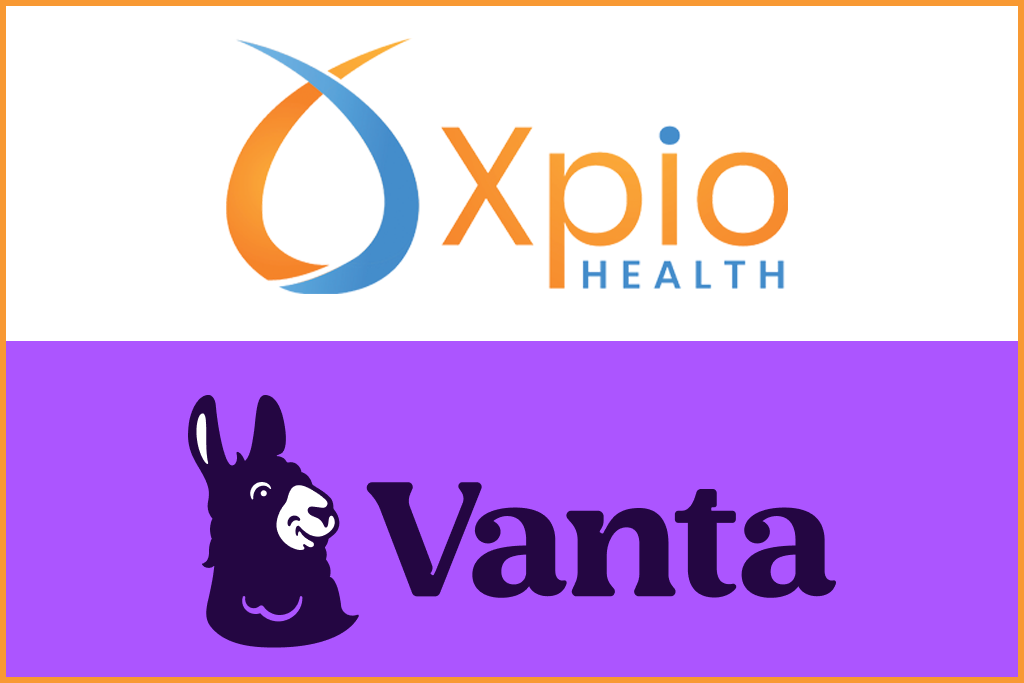
Smart security protects your revenue. Xpio Health’s compliance and cybersecurity program helps behavioral health leaders prevent costly breaches while maintaining efficient operations.
Our expert team understands behavioral health’s unique security challenges. We transform complex HIPAA requirements into clear, actionable measures that protect your organization without burdening your staff or disrupting care delivery.
Our Security Risk Assessment (SRA) builds confidence in your systems.
Partner with Xpio to turn cybersecurity from a concern into a strength. Our proven approach helps you protect your mission, maintain compliance, and focus on what matters most – exceptional patient care.
Schedule a consultation today.
Continuous Compliance
Maintaining compliance in the ever-evolving regulatory landscape can be challenging for healthcare organizations. Xpio Health’s partnership with Vanta offers a powerful solution for continuous compliance monitoring. Vanta’s platform automates many aspects of compliance, providing real-time alerts, robust data encryption, and ongoing monitoring. When deployed by our experienced team at Xpio Health, this solution becomes a powerhouse for maintaining your compliance posture year-round.
Does Continuous Compliance Matter? Continuous compliance is essential for proactive risk management and maintaining the highest standards of data security. It ensures that your organization is always prepared for audits, adapts seamlessly to regulatory changes, and fosters a culture of compliance. This approach allows your team to focus on delivering exceptional patient care, knowing that compliance and security are consistently monitored and managed.
Continuous Compliance provides the framework that instructs healthcare organizations on how to maintain compliance with regulatory standards, how to respond when specific compliance events occur, and what actions to take to address potential issues. It ensures that your team is well-informed about compliance requirements and prepared to act appropriately, thereby reducing the risk of non-compliance and enhancing overall security and efficiency.
» LEARN MORE ABOUT XPIO HEALTH’S CONTINUOUS COMPLIANCE SERVICES
Policies and Procedures
HIPAA regulatory standards require Covered Entities and Business Associates to develop Policies and Procedures. These Policies and Procedures must be updated regularly to account for organizational changes and updates within the regulatory environment. Xpio Health can provide templates for Policies, Procedures, and Plans to help your organization remain compliant with regulatory requirements while hardening the organization’s security posture.
Do Policies and Procedures matter? P&Ps are the cornerstone of HIPAA compliance, considering that the very first standard of the Administrative Requirements of the Privacy Rule (45 CFR § 164.530) states that Covered Entities must “designate a privacy official who is responsible for the development and implementation of the Policies and Procedures of the entity.”
Policies and Procedures provide the guidelines that instruct members of Covered Entities´ and Business Associates´ workforces on how they should carry out their functions in compliance with HIPAA, how they should react when specific events occur, and what sanctions may apply for failing to comply with HIPAA.
Security Risk Assessment
Measure your current security environment against the requirements of the HIPAA Security Rule and other authoritative sources with a comprehensive SRA to identify security gaps and areas that require improvement. NIST frameworks and HHS guidance are employed to evaluate the maturity of organizational controls of in-scope technology assets, including cloud-based technologies and servers within an onsite infrastructure. Each security evaluation results in a Security Risk Analysis and a prioritized proposed plan of action.
Identified compliance gaps must be remediated with documented risk mitigation plans. Mitigation plans must be fully documented and include calendar dates by which deficiencies will be remediated. Each assessment generates a Plan of Action and Milestones to ensure your organization has a roadmap to remediate all discovered gaps.
Do Security Risk Assessments matter? The HIPAA Security Rule requires organizations to implement Policies and Procedures to prevent, detect, contain, and correct security violations. More specifically, Section 164.308(a)(1)(ii)(A) compels Covered Entities and Business Associates to “Conduct an accurate and thorough assessment of the potential risks and vulnerabilities to the confidentiality, integrity, and availability of electronic protected health information held by the [organization].”
A risk assessment helps your organization ensure it is compliant with HIPAA’s administrative, physical, and technical safeguards and reveals areas where your organization’s protected health information (PHI) could be at risk.
vCISO Services
Xpio Health’s virtual Chief Information Security Officer (vCISO) team joins your staff to serve as a point of contact for matters related to developing an organizational security program.
Small and growing healthcare organizations don’t always necessarily have a a fully-realized security program, full-time CISO or the resources required to develop, implement and manage secure information security operations. Xpio’s vCISO team will augment your staff to develop a compliance and cybersecurity program to align your business goals and technical needs with the regulatory requirements of your environment.
Do vCISO Services matter? The advantage of hiring the Xpio vCISO team is the unbeatable value proposition — you gain access to the expertise and experience of a full-time CISO at a fraction of the cost.
Xpio Health’s vCISO team provides your organization with experience, expertise and perspective needed to help your team develop a strong compliance program and a stable security posture on a timeline and budget that works for you.
» LEARN MORE ABOUT XPIO HEALTH’S vCISO SERVICES
HITRUST CSF Assessment
Business Associates, service providers, and other organizations supporting healthcare operations may choose to pursue HITRUST certification to definitively demonstrate how they protect and safeguard ePHI. The HITRUST framework provides a set of standards and auditable controls that bring together several other compliance frameworks and standards, including HIPAA, ISO, GDPR and NIST, for its certifiable framework. HITRUST enables organizations with multiple security and compliance requirements to streamline this process.
Does HITRUST certification matter? With increasing frequency, healthcare payers, systems and hospitals require HITRUST certification from their Business Associates to ensure the highest level of protection of their customers’ healthcare data. Once considered a badge of honor obtained by few, HITRUST is quickly becoming a requirement for healthcare professionals’ efforts to prove their commitment to the confidentiality, integrity and availability of ePHI.
HITRUST certification is the Gold Standard among all cybersecurity frameworks for healthcare. It provides organizations with a comprehensive, flexible, and efficient approach to regulatory compliance and information risk management. HITRUST CSF certification’s “Assess Once, Report Many” approach saves money and effort for organizations that must report their compliance to multiple entities.
» LEARN MORE ABOUT XPIO HEALTH’S HITRUST CSF ASSESSMENT SERVICES
HIPAA Awareness Training
Xpio provides required, documented annual staff training for HIPAA compliance and CFR 42, and specialized training for organizational HIPAA Ambassadors, cybersecurity, and strategic executive teams. We can create training sessions, help customize existing curriculum, deliver classes remotely or in person, and create custom training plans. Training sessions are flexible and can focus on various needs, including awareness of organizational Policies and Procedures, telework, data protection, privacy, breach reporting, governing access to ePHI and identification of malicious software attacks and malware.
Does HIPAA awareness training matter? The Security Rule and the Privacy Rule both contain requirements for HIPAA training. The HIPAA Security Rule training requirement is an administrative safeguard found at 45 CFR § 164.308(a)(5); The HIPAA Privacy Rule training requirement is found at 45 CFR § 164.530(b)(1).
Proper training is an organization’s best line of defense against accidental disclosure of PHI. The HIPAA is complex, and fines can cost millions of dollars. Even unintentional violations committed by undereducated workforce members put entire organizations at risk.
Cybersecurity Assessment
Penetration Testing evaluates the strength of your company’s technology assets, infrastructure, and information systems by revealing vulnerabilities and effectively helping you manage those weaknesses. Think of it as quality assurance for your IT security. Our “ethical hackers” work hard to find the ways real-world cybercriminals would take control of organizational cloud-based systems and onsite servers to obtain data. Penetration tests help organizations prevent data breaches and reinforce existing security measures.
Does penetration testing matter? Remember, HIPAA regulations require Covered Entities to evaluate organizational risks and vulnerabilities and to implement security controls (e.g., access controls, audit controls, data encryption, transmission controls, data integrity controls, protection against malicious software and malware) to address known risks. Penetration Testing is a known, accepted and effective method for testing the efficacy of those security controls.
Penetration testing highlights cyber risks and vulnerabilities, helping organizations prioritize organizational response and identify critical areas for spending.
» CONTACT US TO LEARN HOW XPIO HEALTH CAN HELP WITH YOUR SECURITY, PRIVACY AND COMPLIANCE NEEDS







